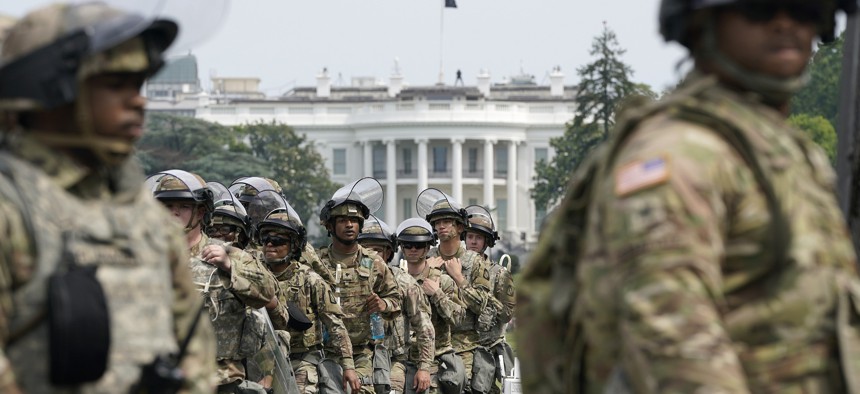
National Guard members deploy near the White House as peaceful protests are scheduled against police brutality and the death of George Floyd, on June 6, 2020. Drew Angerer/Getty Images
Army Chief: We’re Not Pushing Critical Race Theory
“What we’re trying to build is teams where everyone treats everyone with respect,” McConville said.
Just one day after the removal of Richmond’s Robert E. Lee statue, Army Chief of Staff Gen. James McConville pushed back on claims that the military is attempting to “indoctrinate” troops into critical race theory.
“We're not trying to indoctrinate anyone into any theories,” McConville said at the Defense One State of the Army event on Thursday.
The debate over military extremism and critical race theory at military institutions has bubbled over several times in recent months. In June, Chairman of the Joint Chiefs of Staff Gen. Mark Milley’s response to questions about critical race theory went viral.
“I’ve read Mao Zedong. I’ve read Karl Marx. I’ve read Lenin,” Milley said in response to questions from Rep. Matt Gaetz, R-Fla. “That doesn’t make me a communist. So what is wrong with having some situational understanding about the country which we are here to defend?”
Defense Secretary Lloyd Austin was similarly questioned on critical race theory during the same hearing and said the military would not get “distracted” by the debate.
More recently, the critical race theory debate monopolized a defense budget hearing for more than an hour last week as Democrats pushed back on Republican efforts to include a ban on critical race theory at military academic institutions in the upcoming National Defense Authorization Act.
Neither last week nor earlier this year did McConville say anything explicitly about critical race theory when fellow senior Defense leaders were questioned.
“What we’re trying to build is teams where everyone treats everyone with respect,” McConville said Thursday. Those building efforts do not, he added, include indoctrination.
The Army Chief cited the People First Task Force, established in December 2020, as a program designed to “take a look at what was happening” in units across the force.
“When it comes to extremism, at least what we're seeing, the numbers I have are a very, very small amount of people that were concerned,” McConville said. “It doesn’t mean we’re not concerned, but the numbers were extremely small.”
The Pentagon’s Naming Commission just this week sent out a solicitation asking for name recommendations to replace the names of Defense Department sites and properties named for confederate officers.
“It really goes back, to me, to building cohesive teams,” McConville added. “That's what it's all about...We want everyone to make sure they feel like part of the team because that's what wins on the battlefield, and that's what we're trying to do.”
NEXT STORY: GovExec Daily: The Military Legacy of Sept. 11







